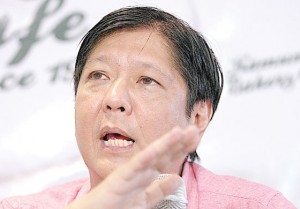Sen. Ferdinand “Bongbong” Marcos Jr., son and namesake of the late president, on Wednesday said his father’s legacy would help rather than hamper his own bid for the vice presidency.
He said his surname was the “greatest blessing,” his first public comments since announcing on Monday that he would run as an independent next year.
His father, or FM, was accused of massive human rights abuses during his two decades in power that were ended by a famous 1986 military-backed “people power” revolution.
But the Marcos patriarch’s son said voters would not be swayed by allegations against his father.
“If you talk to people, they are not concerned about that,” he told reporters.
Filipinos are more worried about poverty, crime and lack of basic infrastructure, which had made commuting in the capital a daily misery for millions, Marcos said.
A “lack of leadership” under President Benigno Aquino 3rd, whose parents led the opposition against the elder Marcos, had exacerbated these woes, he added.
“This is what people are worried about and this is what I will address,” the 58-year-old senator said.
“What happened in 1986 happened already. These things have already been decided.”
The Marcos family was forced into exile in Hawaii in 1986 and its patriarch died there in 1989.
The government accuses the family of stealing $10 billion from public coffers, while activists have recorded at least 882 people who went missing during the period of martial law declared by the then-strongman president.
Aquino in 2013 signed a landmark law compensating thousands of human rights victims of the Marcos regime, many of whom were tortured, raped or detained by Marcos’ security forces.
“We may not bring back the time stolen from martial law victims, but we can assure them of the state’s recognition of their sufferings,” he said at the time.
Before being elected to the Senate in 2010, Marcos’ son served as congressman and governor of his father’s home province of Ilocos Norte.
He said his surname had only bolstered his political comeback.
“I am the luckiest person that I know and being a Marcos is part of that... I have never felt it to be a burden. I have only felt it to be an advantage,” Marcos added.
The most recent poll from one of the country’s major research firms showed Marcos running third in the vice presidential race, with 13 percent saying they would vote for him.
His bid for office is widely seen as a stepping stone to an eventual presidential bid, and rights groups have pledged ferocious campaigns against him.
“I truly believe that I was put in this earth to be a public servant,” Marcos said when asked why he wanted stay in politics and run for a higher position.
Speaking during the weekly Pandesalan news forum in Quezon City (Metro Manila), he admitted that being a public servant was not among his options when he was young, and, in fact, he had been avoiding politics.
“But life brought me back to the life of politics. That’s why here I am,” Marcos said.
According to him, he could just stay as a private individual, put up a business and attend to the needs of his family--which are easier--than to be in politics.
“But we were taught that we are here to serve and that has always been our understanding, that is my continuing motivation,” he said.
“I might be naïve, but maybe it is time to return to that kind of very fundamental understanding why we are in politics,” Marcos said.
He explained that he ran for public office not because he wants to do better for himself, saying he can do it even if he is not a politician.
“I feel that when confronted by some issues, I have the capability and the knowhow to address those problems and bring them to a resolution,” Marcos said.
Senate Minority Leader Juan Ponce Enrile believes that Marcos has a distinct advantage over his rivals in the vice presidency and that is his being an Ilocano.
Enrile said Ilocanos are known to vote for a candidate who is also an Ilocano, just like the Bicolanos who will also go for candidates who are from their region.
“You cannot control them [Ilocanos] in that situation. If an Ilocano is a candidate for a public office, they will all support an Ilocano. That’s the culture,” Enrile said in an interview.
According to him, there are about five million Ilocanos scattered all over the country who are likely to vote for Marcos next year.


